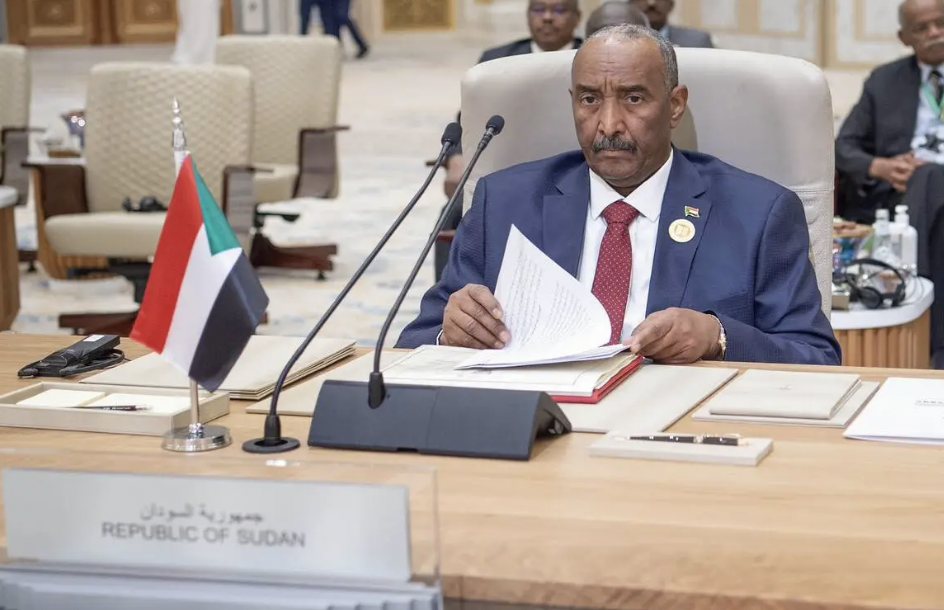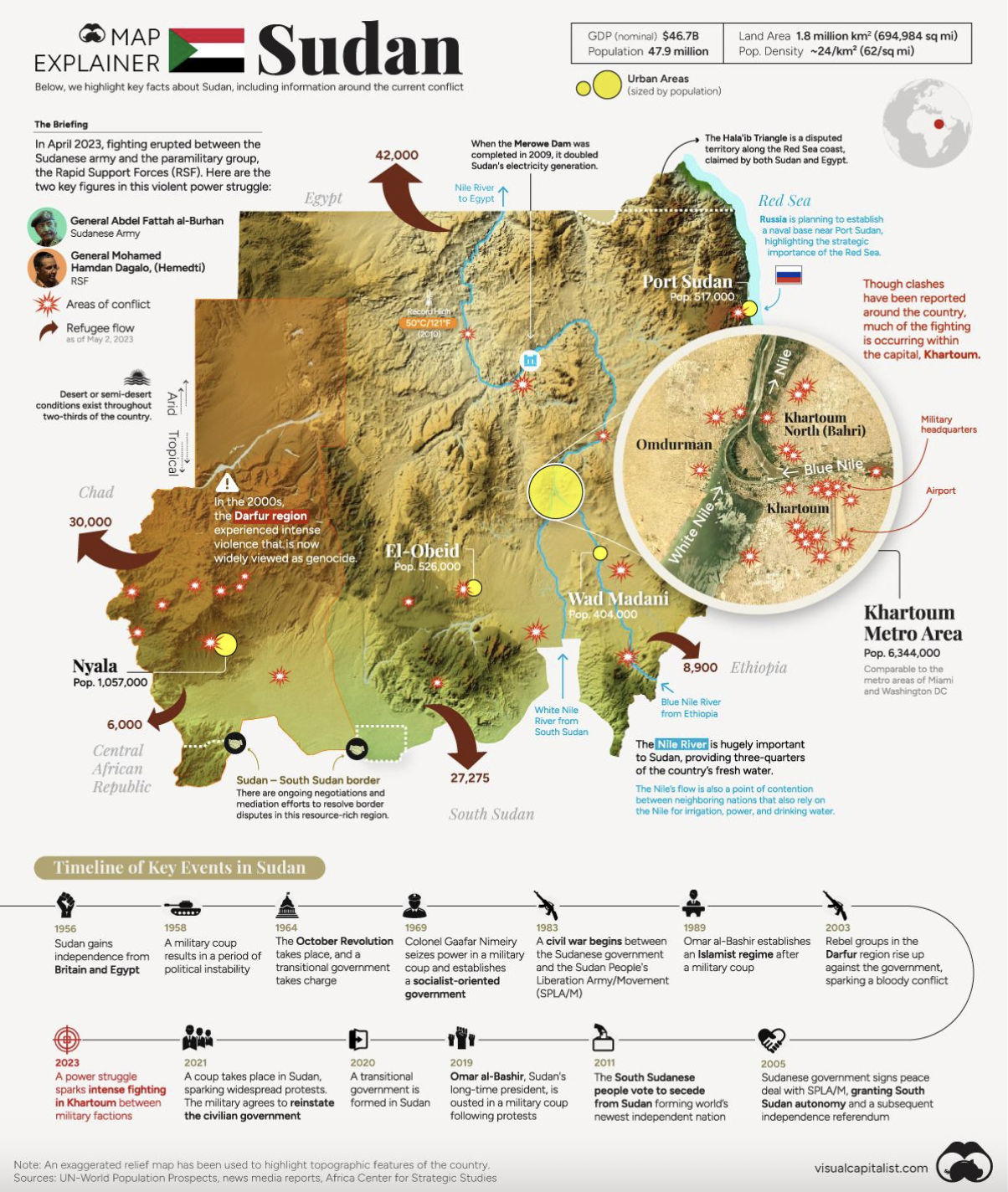Temporal Imperatives in Sudan: The Looming Collapse and the Quest for Timely Intervention
General Abdul Fattah al-Burhan, Chairman of the Sudan Sovereignty Council and Commander of the Army in Riyadh, Saudi Arabia on December 09, 2022. [Royal Court of Saudi Arabia – Anadolu Agency]
Introduction
Today's world is a complex tapestry of socio-political dynamics, with conflicts erupting in various regions. One such conflict that has recently escalated and caught the world’s attention is Sudan. A nation steeped in a rich cultural heritage and blessed with abundant resources has been grappling with internal strife for years. Peace talks in Saudi Arabia brought the issue back to the limelight. The death toll in Sudan reached 9000, and over five million people were forced to flee their homeland[1]. Reengaging the Sudanese Armed Forces (SAF) and the Rapid Support Forces (RSF) in negotiations in Jeddah marks a promising development amid prevailing tensions. However, the path to peace is fraught with several challenges. Hence, it is imperative to delve into its historical context to grasp the intricacies of the conflict and the journey towards peace.
Historical Roots
The roots of the Sudanese conflict can be traced back to colonialism, a legacy that has significantly shaped the country's modern history. Following Sudan's independence in 1956, ethnic, religious, and political divisions contributed to decades of unrest, culminating in South Sudan’s secession in 2011. The remaining Sudan grappled with many conflicts, including the Darfur crisis, the Blue Nile conflict, and ongoing instability in South Kordofan[2]. A turning point in Sudan's history occurred in 2019 when a protracted protest movement driven by economic hardships and political discontent led to the removal of President Omar al-Bashir, and the International Criminal Court (ICC) issued an arrest warrant for him for war crimes and crimes against humanity. This unprecedented uprising offered hope for a more democratic and inclusive future. It also sets the stage for negotiations between the transitional government and various rebel groups[3]. One of the most noteworthy recent developments in Sudan's peace process is the signing of the Juba Peace Agreement in October 2020.
International Mediation
Organisations such as the United Nations, the African Union, together with the United States have been instrumental in convening warring parties at the negotiating table[4]. This comprehensive peace accord aims to address multiple conflicts within the nation, encompassing Darfur, South Kordofan, and the Blue Nile region. Despite these positive strides, security and economic stability remain elusive, and the transition to an entirely civilian government is fraught with complexities. Furthermore, the implementation of the Juba Peace Agreement has faced obstacles, with RSF and SAF groups expressing dissatisfaction and demanding revisions to specific provisions[5].
Sudan's Fight for Survival
The coup of 2021 resulted in the collapse of the peace negotiations, thereby introducing fresh perils. As of April 2023, the RSF and SAF leaders have been embroiled in conflict in several cities and towns, including the capital, Khartoum, resulting in the ‘worst nightmare’ for the Sudanese people and the region. Six months into the civil war had pushed Sudan into a state failure and will become a catastrophe for the region for the decades to come. Outside actors must seize every opportunity to bring the parties back to dialogue before the moment is lost.
Whether or not the two sides will find a middle path is an open question. However, there is enough reason for both sides to come to the negotiating table as the RSF is losing ground support and battlefield losses to SAF[6]. Neither the SAF nor RSF will be able to govern the country once the war is over. The diplomats must employ this reasoning to persuade the parties to establish a transitional government. The consequences of not doing so are severe and could have a detrimental impact on Sudan's fragile situation. A humanitarian ceasefire should be implemented now, and it is crucial that the international community makes a coordinated effort to achieve this goal. The ongoing peace talks in Jeddah are a positive development, “although they must be aligned with the theoretical political framework in Addis Ababa for them to make complete sense”[7].
Conclusion
International mediation, coupled with the determination of Sudan's leaders and its resilient population, continues to be a critical element in the peacebuilding process. While challenges persist, the unfolding peace developments in Sudan offer hope for a brighter future, underscoring the importance of international support and sustained dialogue.
In conclusion, the situation in Sudan is a stark reminder of the devastating impact of conflict on societies. It underscores the urgency for peacebuilding initiatives worldwide. As we continue to monitor this situation, let us remember that every step towards peace, no matter how small, brings us closer to a world where conflicts are resolved through dialogue and mutual respect.
[1] “UN Relief Chief Urges End to ‘Humanitarian Nightmare’ in Sudan | The United Nations Office at Geneva,” October 15, 2023, https://www.ungeneva.org/en/news-media/news/2023/10/86329/un-relief-chief-urges-end-humanitarian-nightmare-sudan.
[2] Douglas H. Johnson, The Root Causes of Sudan’s Civil Wars: Old Wars and New Wars (Expanded 3rd Edition), 1st ed. (Boydell and Brewer Limited, 2016), https://doi.org/10.1017/9781782048343.
[3] Jérôme Tubiana, “Darfur after Bashir: Implications for Sudan’s Transition and for the Region,” n.d.
[4] Habiba Abubakar and Naiade El, “Sudan: Present Situation; Challenges and Prospects,” n.d.
[5] Zaid Al-Ali, “The Juba Agreement for Peace in Sudan,” n.d.
[6] “Time to Try Again to End Sudan’s War,” July 21, 2023, https://www.crisisgroup.org/africa/horn-africa/sudan/time-try-again-end-sudans-war.
[7] Shola Lawal, “Why Are Sudan’s Warring Factions Meeting in Jeddah?,” Al Jazeera, accessed November 4, 2023, https://www.aljazeera.com/news/2023/10/31/why-are-sudans-warring-factions-meeting-in-jeddah.


